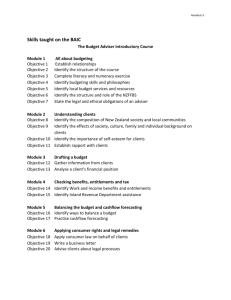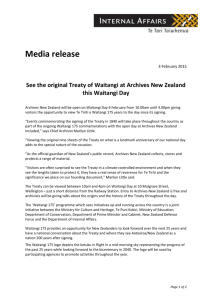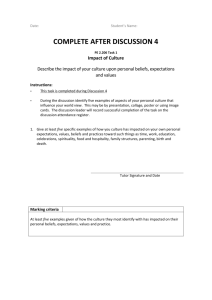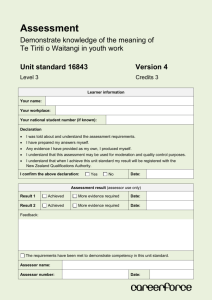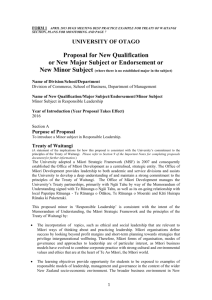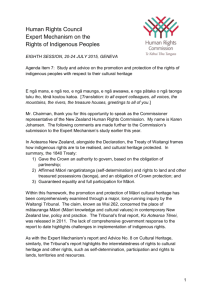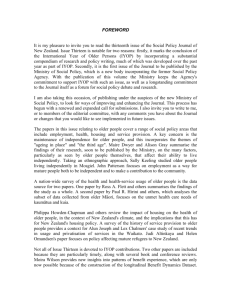Native Lands Act 1862
advertisement
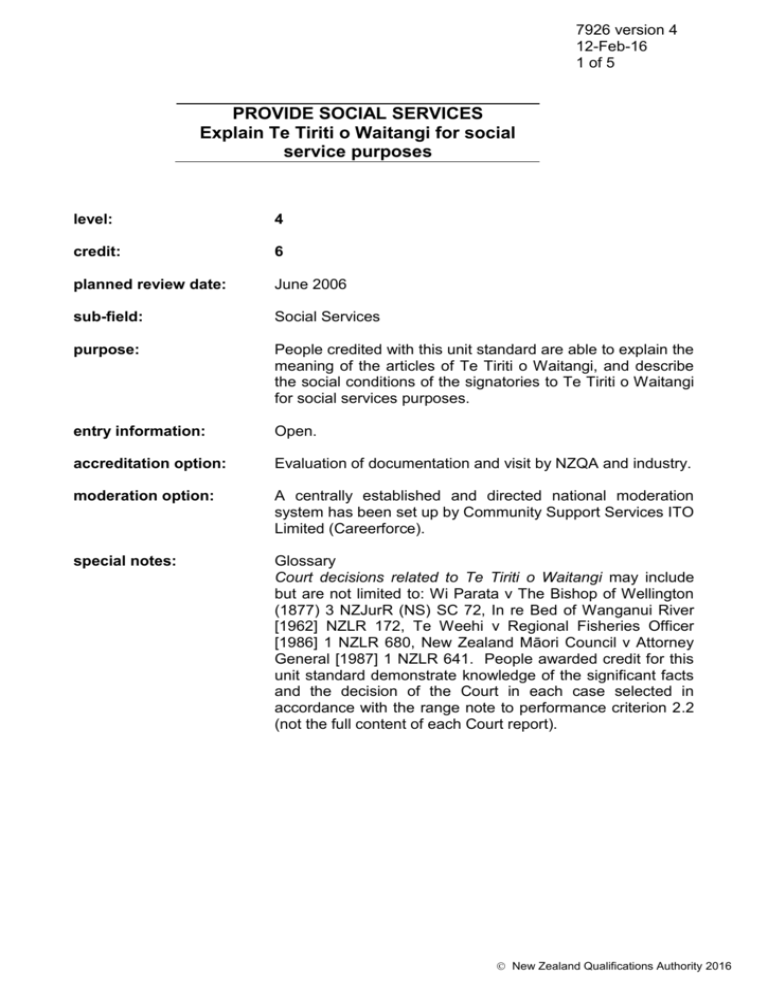
7926 version 4 12-Feb-16 1 of 5 PROVIDE SOCIAL SERVICES Explain Te Tiriti o Waitangi for social service purposes level: 4 credit: 6 planned review date: June 2006 sub-field: Social Services purpose: People credited with this unit standard are able to explain the meaning of the articles of Te Tiriti o Waitangi, and describe the social conditions of the signatories to Te Tiriti o Waitangi for social services purposes. entry information: Open. accreditation option: Evaluation of documentation and visit by NZQA and industry. moderation option: A centrally established and directed national moderation system has been set up by Community Support Services ITO Limited (Careerforce). special notes: Glossary Court decisions related to Te Tiriti o Waitangi may include but are not limited to: Wi Parata v The Bishop of Wellington (1877) 3 NZJurR (NS) SC 72, In re Bed of Wanganui River [1962] NZLR 172, Te Weehi v Regional Fisheries Officer [1986] 1 NZLR 680, New Zealand Māori Council v Attorney General [1987] 1 NZLR 641. People awarded credit for this unit standard demonstrate knowledge of the significant facts and the decision of the Court in each case selected in accordance with the range note to performance criterion 2.2 (not the full content of each Court report). New Zealand Qualifications Authority 2016 7926 version 4 12-Feb-16 2 of 5 PROVIDE SOCIAL SERVICES Explain Te Tiriti o Waitangi for social service purposes Legislation related to the articles of Te Tiriti o Waitangi may include but is not limited to: Land Claims Ordinance 1841, New Zealand Constitution Act 1852, Native Lands Act 1862, Suppression of Rebellion Act 1863, New Zealand Settlements Act 1863, Native Land Act 1865, Māori Representation Act 1867, Māori Prisoners Trials Act 1879, West Coast Peace Preservation Act 1882, Native Lands Administration Act 1886, Native Land Purchase and Acquisition Act 1893, Land Settlement Act 1904, Suppression of Tohunga Act 1907, Public Works Acts, Māori Affairs Act 1953, Māori Affairs Amendment Act 1967, Treaty of Waitangi Act 1975. People awarded credit for this unit standard demonstrate knowledge of the primary purpose of each example of legislation selected in accordance with the range note to performance criterion 2.1 (not the full content of each ordinance or statute). Social conditions include: cultural, economic, educational, health, political, and social factors. New Zealand Qualifications Authority 2016 7926 version 4 12-Feb-16 3 of 5 PROVIDE SOCIAL SERVICES Explain Te Tiriti o Waitangi for social service purposes Elements and Performance Criteria element 1 Explain the meaning of the articles of Te Tiriti o Waitangi. Range: evidence is required in relation to the four articles of Te Tiriti o Waitangi. performance criteria 1.1 The explanation includes an outline of relevant factors leading up to the signing of Te Tiriti o Waitangi. Range: relevant factors may include but are not limited to - Declaration of Independence 1835; social conditions of Māori in 1840; social conditions of Pakeha in originating countries leading to migration; social conditions of Pakeha in Aotearoa in 1840; arrivals and colonisation intentions of America, Britain, and France; land sales; lawlessness. Evidence is required of Declaration of Independence 1835 and four other relevant factors. 1.2 The explanation includes a description and comparison of Māori and Crown intentions in signing Te Tiriti o Waitangi according to Māori and Crown sources in 1840. 1.3 The explanation compares the text in Te Reo Māori and the text in English of Te Tiriti o Waitangi and defines differences in meaning between the Māori text and English text. 1.4 The explanation defines the meaning of te tino rangatiratanga in terms of Māori and Crown sources. 1.5 The explanation defines the meaning of kāwanatanga in terms of Māori and Crown sources. 1.6 The explanation defines the meaning of ōritetanga in terms of Māori and Crown sources. 1.7 The explanation defines the meaning of the fourth article of Te Tiriti o Waitangi in terms of Māori and Crown sources. New Zealand Qualifications Authority 2016 7926 version 4 12-Feb-16 4 of 5 PROVIDE SOCIAL SERVICES Explain Te Tiriti o Waitangi for social service purposes 1.8 The explanation defines the meaning of the articles of Te Tiriti o Waitangi in terms of the rights and obligations agreed to by the signatories to Te Tiriti o Waitangi. 1.9 The explanation defines the meaning of contra proferentem and its relevance to Te Tiriti o Waitangi. element 2 Describe the social conditions of the signatories to Te Tiriti o Waitangi for social services purposes. performance criteria 2.1 The description outlines the impact of legislation related to the articles of Te Tiriti o Waitangi on the social conditions of Māori subsequent to 1840. Range: 2.2 evidence is required of three items of legislation. The description outlines the impact of Court decisions related to the articles of Te Tiriti o Waitangi on the social conditions of Māori subsequent to 1840. Range: evidence is required of two Court decisions. 2.3 The description identifies and compares changes in the social conditions of the signatories to Te Tiriti o Waitangi from 1840 to the present day in terms of the articles of Te Tiriti o Waitangi. 2.4 The description outlines issues that are relevant to social services purposes in terms of the social conditions of the signatories to Te Tiriti o Waitangi in the present day. Range: issues relevant to social services purposes include but are not limited to - criminal justice issues, economic status, educational attainment, employment and unemployment, health, land ownership, political issues, Te Reo Māori. Evidence is required of two issues. New Zealand Qualifications Authority 2016 7926 version 4 12-Feb-16 5 of 5 PROVIDE SOCIAL SERVICES Explain Te Tiriti o Waitangi for social service purposes Comments to: Careerforce PO Box 2637 Wellington 6140 Please Note: Providers must be accredited by the Qualifications Authority before they can offer programmes of education and training assessed against unit standards. Accredited providers assessing against unit standards must engage with the moderation system that applies to those unit standards. [Please refer to relevant Plan ref: 0222] New Zealand Qualifications Authority 2016
